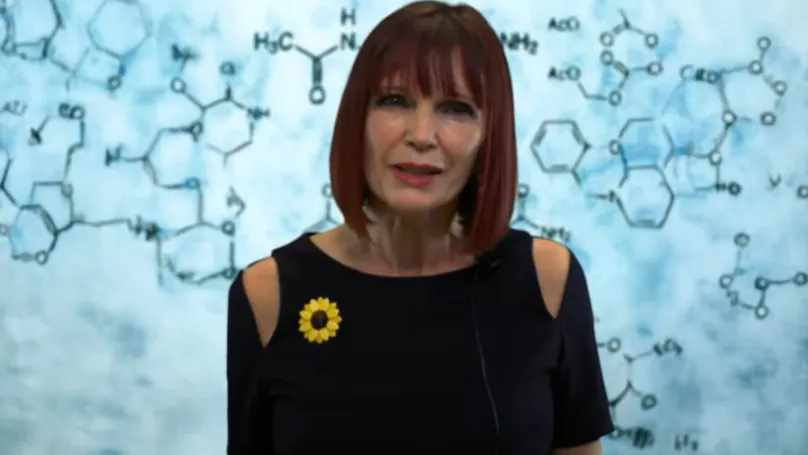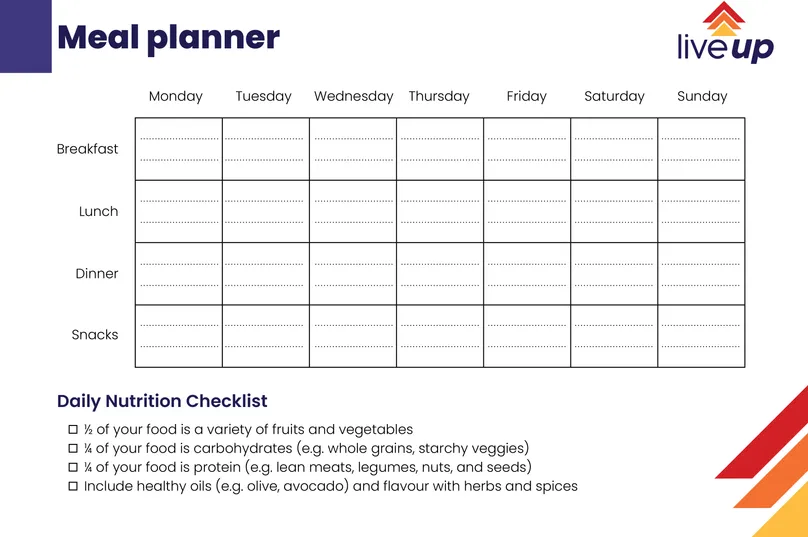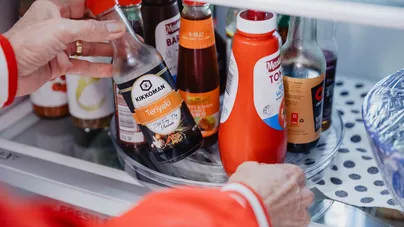Enjoying a healthy diet can help you improve your quality of life. However, what a healthy diet is for you may change as you get older.
As you age, your nutritional needs evolve. Your body composition changes, you produce less saliva, and you’re more likely to underproduce stomach acid. Additionally, your lifestyle may be less active than it once was.
These changes often mean you need fewer calories but more essential nutrients. To meet these needs, it’s important to adjust your diet accordingly.
Video: Let's hear from a dietician

This is Dr Natalie Colson (Griffith University). Dr Colson is a molecular geneticist and accredited practising dietitian. She has over 15 years of experience as an educator and researcher.
In this video, Dr Colson responds to common questions about how our dietary needs change over time. She discusses the common nutritional challenges faced by older adults. She also offers practical tips and solutions to these issues.
Quick summary
To eat for good health as you age, Dr Colson recommends a nutrient-dense diet. To achieve this, she emphasises the importance of:
- Fruits and vegetables (aim for 5 serves of vegetables and 2 serves of fruit every day, where a serve is about 75g)
- Lean proteins
- Wholegrains
- Dairy products (or plant-based substitutes)
- Healthy fats such as olive oil and fatty fish
She also recommends being cautious of saturated fats and highly processed, sugary foods, and excess salt.
Here's some more information on the key nutrients that become critical with ageing, and what foods you can find them in:
Key nutrients
Protein
Protein is vital for maintaining muscle and bone mass. It supports recovery and healing processes. Some healthy sources of protein include:
- Lean meats and seafood
- Low-fat dairy products
- Legumes (beans, lentils, and peas)
- Nuts and seeds
- Whole grains like oats, quinoa, or brown rice
Calcium
Calcium is important for bone health and reducing your risk of fractures. You can find calcium in:
- Low-fat dairy products
- Fortified plant-based milks and breakfast cereals
- Cruciferous vegetables (dark leafy greens) like broccoli and bok choy
Dr Colson notes that many older people begin to have trouble digesting milk. If this is the case for you, consider lactose-free milk as an alternative source of calcium.
Vitamin D
To absorb your calcium, you need enough vitamin D. Your body produces vitamin D from sunlight, but it can also be found in food. You can find vitamin D in:
- Egg yolks
- Fortified foods, including fruit juices, cereals, and plant-based milks
- Mushrooms
- Fatty fish, such as salmon and mackerel
All fish contain some mercury, but it's generally safe and even recommended to eat 2-3 serves of fish a week, including any type of tuna or salmon, canned or fresh.
B12 and iron
B vitamins (especially B12) and iron are crucial for brain health and energy levels. Both are predominantly found in animal products. This includes fish, eggs, dairy, and of course, meat.
However, while red meat is a significant source of these nutrients, it’s best consumed in moderation. The Cancer Council recommends no more than 455g cooked (700g raw) lean red meat per week. It’s also recommended to minimise your intake of processed and charred meats.
You can find B12 and iron in foods other than meat, too. There's B12 in fortified foods, nutritional yeast, and nori (the seaweed used to wrap sushi rolls). There's also 71% of the recommended daily dose of iron in just 1 cup of spinach.
Alternatives to red meat
Had enough red meet this week and unsure what to use as substitute?
Here are some satisfying alternatives to a serving of red meat:
- 65–100g cooked chicken
- 80–120g cooked fish fillet (preferably oily, recommended at least twice a week)
- Two small eggs
- ⅓ cup cooked legumes (lentils, chickpeas, beans) or nuts
For those who eat meat, it’s important to also eat plenty of plant-based foods like fruits, vegetables, legumes, and whole grains.
Omega-3 fatty acids and antioxidants
These are both vital for brain health. They can help reduce inflammation and oxidative stress and improve your mood. Good sources include berries, walnuts, and wild-caught salmon.
It’s important not to avoid fats entirely, even if you have high cholesterol. Instead, it’s better to choose healthy fats such as Omega-3 over unhealthy fat sources like saturated fats.
According to the Cancer Council, eating foods rich in omega-3 can help reduce your risk of heart disease and even lessen the symptoms of arthritis.
Magnesium and zinc
Both magnesium and zinc are important for immune function and healing, as well as your mood and mental health.
You can find both these nutrients in:
- Whole grains
- Nuts
- Seeds
- Legumes
Best ways to get your nutrients
Eat a variety of wholefoods
The best way to get all your nutrients without excess calories from unhealthy additives is to eat a variety of wholefoods. Wholefoods, such as fruit and veg, are minimally processed and retain their natural nutrients. So, they’re more likely to provide what you need without hurting your heart.
Here’s how you can build a balanced, heart-healthy meal:
- Fill half your plate with a mix of fruits and vegetables.
- Fill one quarter with carbohydrates from whole grains or starchy vegetables.
- Fill the remaining quarter with protein sources like lean meats or legumes.
- Include healthy fats, such as olive oil and avocado, and herbs and spices to enhance flavour instead of extra salt.
Aim for 5 veg and 2 fruit
The recommended goal is to eat 5 servings of vegetables and 2 of fruit every day. In fact, according to Dr Colson, higher intake of fruit and vegetables is associated with greater resilience to depression.
Dr Colson's advice for meeting the 5 and 2 goal is to try cooking your vegetables into different foods. For example, cooking extra carrots into your bolognese sauce.
Snack smart
You can choose nutrient-dense snacks rather than calorie-dense ones. Nuts and seeds are goods snacks that combine protein with healthy fats.
If you’re a lover of desserts, you can also try healthy sweets. Increase the nutrition and decrease the sugar and saturated fats in your treats. Try fruits with yoghurt or custard instead of ice cream, for example. You can include oat-based biscuits or almond flakes for crunchiness.
Meal planning
A weekly meal plan could help you be sure to include key nutrients in your diet. When designing your plan, check what’s already in your pantry. Use this as a base for meals you can create throughout the week. Then create a list of ingredients to buy to complete those dishes and provide any missing nutrients.
For example, you can buy milk or fortified alternatives to fulfill your calcium needs. Add this to smoothies, soups, or cereals. Also consider easy-to-prepare protein sources, such as scrambled eggs, grilled fish, or bean salads.
Consult your doctor or dietitian for specific advice about your meal plan.
Download LiveUp's weekly meal planner
To help you plan your meals, you can download and print this weekly meal planner, complete with a basic nutrition checklist:

Common nutritional challenges for older people
Absorption issues
Producing less saliva or stomach acid can make it harder for older people to absorb nutrients. To address this, talk with your doctor or dietician about the possibility of supplements. Always check with a health professional before taking new supplements or medications.
You may need to consider the impact of any medications you take on how you absorb nutrients. Health conditions such as diabetes and high blood pressure can also affect your dietary needs. Be sure to ask your doctor if you have any health concerns.
Weight management
Whether you want to lose or gain weight, it’s best to focus on nutrient-heavy foods.
- Needing fewer calories but more nutrients can mean it’s easy to gain weight unintentionally. This can stress your heart, joints, and spine. Nutrient-dense meals can help you meet your nutritional needs without overloading on calories.
- At the same time, a decrease in appetite is common in older people. This can lead to unintentional weight loss or malnutrition. In this case, nutrient-packed snacks throughout the day can help you meet your nutritional and caloric needs.
Constipation and digestive health
With slower digestion, fibre is crucial to prevent constipation. It's not only good for your gut health, but also your microbiome.
Here’s how you can increase your fibre intake:
- Eat more oats, seeds, nuts, legumes, and vegetables.
- Choose whole grains over refined options. For example, consider brown rice, wholemeal pasta, or wholegrain bread over white.
If you’re increasing your fibre intake, do so gradually, to avoid discomfort.
Regular exercise and staying hydrated are also crucial for digestion and overall health.
Oral health
Maintaining good oral health is essential for enjoying a diverse diet. Older adults may face increased tooth decay due to producing less saliva.
You can combat dry mouth by sipping water regularly. It also helps to limit sugary drinks and brush your teeth twice daily.
If you have difficulty chewing or swallowing, you can find protein in soft foods. For example, yogurt, soups, smoothies, scrambled eggs, or tender meats. You can also enhance moisture and flavour with olive oil or gravy. Just stay cautious of added sugars and salt in store-bought dressings and sauces.
Take charge of your health today
Navigating nutrition as you age may seem daunting. But with the right knowledge and strategies, it can be manageable and rewarding. Put simply, one thing you can do to take charge of your health is to eat a variety of wholefoods rich in essential nutrients.
Another thing you can do is get in touch with our helpful team on 1800 951 971 or take the quick quiz. You can also explore the LiveUp website for more resources and tips on eating well and other healthy ageing choices.
References
LiveUp. (2024). Interview with Dr. Natalie Colson.
Barbagallo, M., & Dominguez, L. J. (2010). Magnesium and aging. Current Pharmaceutical Design, 16(7), 832–839. https://doi.org/10.2174/138161210790883679
Barbagallo, M., Veronese, N., & Dominguez, L. J. (2021). Magnesium in Aging, Health and Diseases. Nutrients, 13(2), 463. https://doi.org/10.3390/nu13020463
Boucher, B. J. (2018). Vitamin D status and its management for achieving optimal health benefits in the elderly. Expert Review of Endocrinology & Metabolism, 13(6), 279–293. https://doi.org/10.1080/17446651.2018.1533401
Cancer Council Australia. Fish, omega-3 fatty acids, and cancer. https://www.cancer.org.au/about-us/policy-and-advocacy/prevention/obesity/related-resources/fish-omega-3-fatty-acids-and-cancer
Cancer Council Australia. Meat and cancer. https://www.cancer.org.au/about-us/policy-and-advocacy/prevention/obesity/related-resources/meat-and-cancer
Cronin, P., Joyce, S. A., O'Toole, P. W., & O'Connor, E. M. (2021). Dietary Fibre Modulates the Gut Microbiota. Nutrients, 13(5), 1655. https://doi.org/10.3390/nu13051655
Donini, L. M., Savina, C., & Cannella, C. (2009). Nutrition in the elderly: Role of fiber. Archives of Gerontology and Geriatrics, 49(Supplement), 61-69. https://doi.org/10.1016/j.archger.2009.09.013
Harvard Health Publishing. (2024, June). More evidence that ultra-processed foods harm health. https://www.health.harvard.edu/nutrition/more-evidence-that-ultra-processed-foods-harm-health
Healthline. (2020, July). Vitamin B12 foods for vegetarians. https://www.healthline.com/health/vitamin-b12-foods-for-vegetarians#bottom-line
Healthline. (2023, July). Iron-rich plant foods: A complete guide. https://www.healthline.com/nutrition/iron-rich-plant-foods#increasing-iron-absorption
Healthline. (2024, May). What is hypochlorhydria (low stomach acid)? https://www.healthline.com/health/hypochlorhydria
Heart Foundation. (2024, February). Healthy eating to protect your heart. https://www.heartfoundation.org.au/healthy-living/healthy-eating/healthy-eating-to-protect-your-heart
Heart Foundation. Heart-healthy eating pattern. https://www.heartfoundation.org.au/healthy-living/healthy-eating/heart-healthy-eating-pattern
Khan, B., Nowson, C. A., Daly, R. M., English, D. R., Hodge, A. M., Giles, G. G., & Ebeling, P. R. (2015). Higher dietary calcium intakes are associated with reduced risks of fractures, cardiovascular events, and mortality: A prospective cohort study of older men and women. Journal of Bone and Mineral Research, 30(10), 1758–1766. https://doi.org/10.1002/jbmr.2515
Kiouri, D. P., Tsoupra, E., Peana, M., Perlepes, S. P., Stefanidou, M. E., & Chasapis, C. T. (2023). Multifunctional role of zinc in human health: an update. EXCLI journal, 22, 809–827. https://doi.org/10.17179/excli2023-6335
Mahmoud, A. S. (2019). Role of coenzyme Q10 and omega-3 fatty acid in protection, maintaining, and enhancing brain functions and intelligence that decline with age. Middle East Journal for Scientific Publishing, 2(3), 25–37. 1681059125_877718405.pdf
New South Wales Food Authority. Mercury and fish. Retrieved November 20, 2024, from https://www.foodauthority.nsw.gov.au/consumer/life-events-and-food/pregnancy/mercury-and-fish
Nowson, C., & O'Connell, S. (2015). Protein requirements and recommendations for older people: A review. Nutrients, 7(8), 6874-6899. https://doi.org/10.3390/nu7085311
Ocean, N., & Howley, P. (2019, Feb). Eating more fruit and vegetables linked to better mental well-being – new study. The Conversation. https://theconversation.com/eating-more-fruit-and-vegetables-linked-to-better-mental-well-being-new-study-111211
Rémond, D., Shahar, D. R., Gille, D., Pinto, P., Kachal, J., Peyron, M. A., Dos Santos, C. N., Walther, B., Bordoni, A., Dupont, D., Tomás-Cobos, L., & Vergères, G. (2015). Understanding the gastrointestinal tract of the elderly to develop dietary solutions that prevent malnutrition. Oncotarget, 6(16), 13858–13898. https://doi.org/10.18632/oncotarget.4030
Wang, J., Um, P., Dickerman, B. A., & Liu, J. (2018). Zinc, magnesium, selenium and depression: A review of the evidence, potential mechanisms and implications. Nutrients, 10(5), 584. https://doi.org/10.3390/nu10050584
Wawer, A. A., Jennings, A., & Fairweather-Tait, S. J. (2018). Iron status in the elderly: A review of recent evidence. Mechanisms of Ageing and Development, 175, 55–73. https://doi.org/10.1016/j.mad.2018.07.003
Wong, C. W. (2015). Vitamin B12 deficiency in the elderly: Is it worth screening? Hong Kong Medical Journal, 21(2), 155–164. https://doi.org/10.12809/hkmj144383
Zinc: Dietary intake and impact of supplementation on immune function in the elderly. (2013). Current Aging Science, 35, 839–860. https://doi.org/10.1007/s11357-011-9377-3
How to use this information
LiveUp provides free information to help you make informed decisions about your health. This information is for general and educational purposes only, is not intended to provide a comprehensive guide, and does not replace medical advice. Everyone is different, so some of these tips may work better for you than others. You should use your own judgment and seek medical advice when applying this information to yourself, to determine if it is suitable in your circumstances. Your use of, or reliance on, this information is solely at your own risk. Independent Living Assessment Incorporated is not responsible or liable for any injury, loss, or damage caused as a result of your use of, or reliance on, this information.
Download and print this article:
You can print out the PDF and stick it to your fridge or file away the tips to revisit at a later time.

Read more Nutrition articles
Did you enjoy this article? You may also like reading similar healthy ageing articles.
See all Nutrition articles

